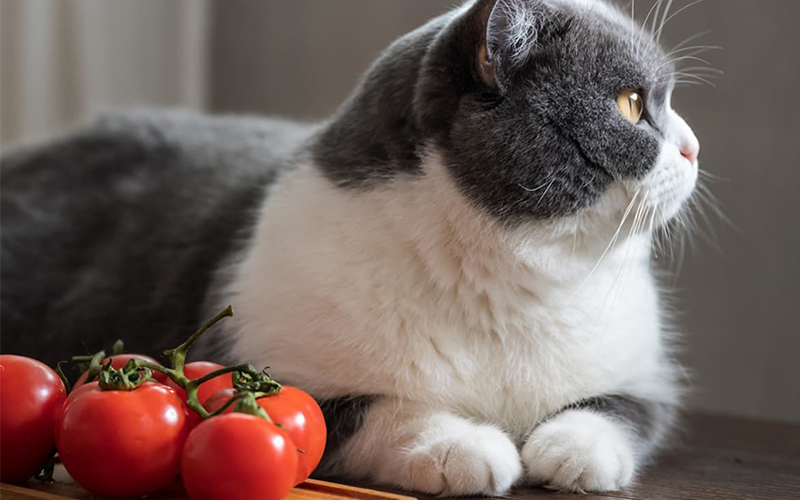Can Cats Eat Tomatoes? What You Need to Know About Cats and Tomatoes
- 19 Feb 2025 11:41
As a cat owner, you may be curious about whether it’s safe to feed your cat tomatoes. Tomatoes are a common fruit in many households, but when it comes to your feline companion, the answer isn’t as straightforward as it may seem.

Are Tomatoes Safe for Cats?
While ripe tomatoes themselves are generally safe in small amounts, certain parts of the tomato plant can be toxic to cats. Understanding the potential risks and benefits of feeding tomatoes to your cat is crucial to ensure their health and safety.
The Risks of Feeding Tomatoes to Cats
Tomato Plant Toxicity: The primary concern with tomatoes is not the fruit itself, but rather the tomato plant (including the leaves, stems, and unripe tomatoes). These parts of the tomato plant contain a substance called solanine, which is toxic to cats (and other animals). Solanine can cause vomiting, diarrhea, lethargy, and in severe cases, even more serious health issues. It’s important to never allow your cat to chew on or ingest the green parts of the tomato plant.
Unripe Tomatoes: Unripe tomatoes (those that are green or just starting to turn red) contain higher levels of solanine compared to ripe tomatoes. Green tomatoes can also cause digestive upset and toxicity in cats. You should always ensure that any tomatoes you offer your cat are fully ripe and have been thoroughly washed.
Digestive Issues: While ripe tomatoes are generally safe for cats in small amounts, they can still cause mild digestive upset in some cats, particularly if they have sensitive stomachs. If your cat eats too much tomato, they may experience vomiting or diarrhea. Always introduce new foods to your cat’s diet gradually and monitor for any adverse reactions.
Seasonings and Additives: When tomatoes are served in dishes, they are often seasoned with ingredients like salt, onions, garlic, or spices, all of which can be harmful to cats. These seasonings should never be fed to your cat, as they can be toxic.
Potential Benefits of Tomatoes for Cats
Tomatoes, when offered safely and in moderation, do provide some nutritional benefits:
Vitamins and Antioxidants: Tomatoes are a good source of vitamins, including vitamin C, vitamin K, and folate, as well as antioxidants like lycopene. These nutrients can contribute to your cat’s overall health, supporting their immune system and helping to maintain healthy skin.
Fiber: Tomatoes contain fiber, which can aid in digestion when fed in small amounts. However, cats are obligate carnivores, and their bodies don’t require much fiber in their diet, so this benefit is minimal.
How to Safely Feed Tomatoes to Your Cat
If you decide to give your cat a small piece of ripe tomato, here are a few precautions to follow:
Only Serve Ripe Tomatoes: Never feed your cat green tomatoes, as they contain solanine, which can be harmful. Only offer fully ripe tomatoes, which are safer and more likely to be digested properly.
Remove the Skin and Seeds: It’s a good idea to peel the tomato and remove the seeds before offering it to your cat. The skin and seeds can be difficult for your cat to digest and may cause some gastrointestinal discomfort.
Serve in Moderation: Even though ripe tomatoes are not toxic, they should only be given to your cat in small amounts and as an occasional treat. Tomatoes should not be a regular part of your cat’s diet.
Avoid Seasoned Dishes: If you serve your cat tomatoes as part of a meal or salad, make sure there are no added seasonings, such as salt, garlic, or onions, as these are harmful to cats.
Can Kittens Eat Tomatoes?
Kittens should be treated with extra caution when it comes to new foods. Their digestive systems are more sensitive, and they are at greater risk of food sensitivities. If you want to introduce tomatoes to a kitten’s diet, it’s best to consult a professional first and offer only very small amounts of fully ripe tomato.
Signs of Tomato Toxicity in Cats
If your cat has ingested the green parts of a tomato plant or unripe tomatoes, watch for the following symptoms of toxicity:
Vomiting
Diarrhea
Lethargy or weakness
Drooling
Loss of appetite
If you notice any of these symptoms after your cat consumes a tomato plant or an unripe tomato, contact a pet health professional immediately.
Conclusion
Can cats eat tomatoes? Yes, but with caution. Ripe tomatoes in small amounts are generally safe for cats to eat and can offer some nutritional benefits. However, you must avoid feeding your cat unripe tomatoes or any part of the tomato plant, as they contain solanine, which can be toxic to cats.
If you’re ever unsure about what foods are safe for your cat, or if you need guidance on your pet’s diet and health, consider using PettureX. With 24/7 online consultations, PettureX offers expert advice and support, helping you make the best decisions for your cat’s well-being.
Related

Frankly Dangerous: Can Cats Eat Hot Dogs? Vet Explains the Serious Risks
- 16 Apr 2025
A Purrfect Protein? Can Cats Eat Ground Turkey Safely? (Vet-Reviewed Guide)
- 16 Apr 2025
Gritty Situation: Can Cats Eat Grits Safely? Vet Explains the Risks
- 16 Apr 2025
Crunchy Query: Can Cats Eat Green Peppers? A Vet-Reviewed Safety Analysis
- 16 Apr 2025
Gravy Danger Zone: Can Cats Eat Gravy Safely? (Vet-Reviewed Warning)
- 16 Apr 2025
Toxic Temptation: Can Cats Eat Grapefruit? Vet Explains the Dangers
- 16 Apr 2025
Emergency Meal or Major Mistake? Can Cats Eat Dog Food For A Couple Days? (Vet Guide)
- 16 Apr 2025
Dandelions & Felines: Can Cats Eat These Common Weeds Safely? Vet Explains
- 16 Apr 2025
Flaky Danger: Can Cats Eat Croissants Safely? Vet Explains the Buttery Risks
- 16 Apr 2025
Hazard Alert: Can Cats Eat Corn Husks? Vet Explains Dangers of This Fibrous Material
- 16 Apr 2025
